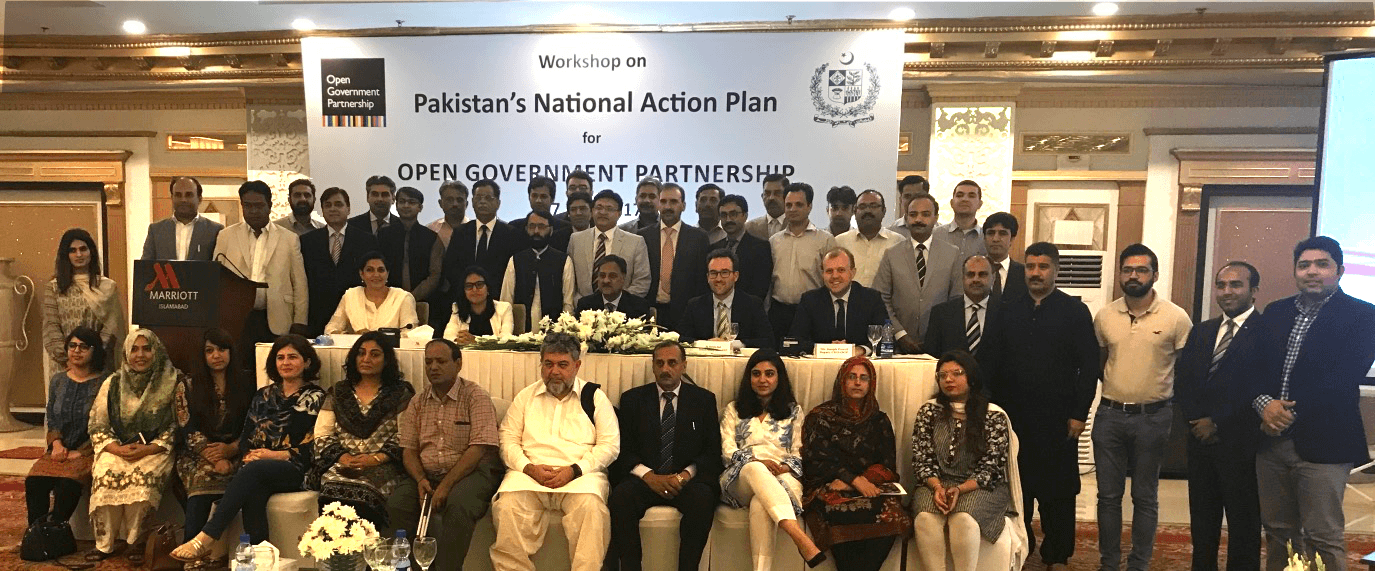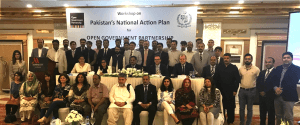Opening Remarks by Joe Powell, Deputy CEO Open Government Partnership at the Islamabad OGP Pakistan Meeting July 2017

27 July 2017 – Islamabad, Pakistan
Thank you to the Government and civil society of Pakistan for the invitation to join you today. It’s a great honour to be with you in this beautiful city.
First, let me say on behalf of the 75 member countries, and thousands of civil society organisations who are part of our community, congratulations to Pakistan on joining the Open Government Partnership. We in the OGP team are delighted to be here in person in Islamabad to support all of you to make the most of the OGP framework, and to develop a set of open governance reform commitments that can have a transformative impact in the lives of Pakistanis.
Now I have to reveal a secret – joining OGP is actually the easy part.
As any reformer in government knows it is a continual struggle to work collaboratively with civil society, to challenge vested interests who support the status quo, and to win the internal arguments with your colleagues who may find open government a scary prospect. None of this is easy.
The good news is OGP is a world-leading support network for reformers. Whether you are working on open data, on service delivery or on fiscal transparency, we can connect you to peers in other countries who are going through the same struggles. Every member of OGP has something to learn and something to share, regardless of geography, income or political orientation. This is a truly global, universal partnership.
And crucially that partnership extends to the role of civil society in OGP. At the last global summit in Paris, where Minister Dar presented Pakistan’s letter of intent to join OGP to former President Hollande, it was with a backdrop of civil society and government leaders together on stage. Our global governance body is half Government ministers and half civil society leaders. And in every OGP country civil society has an equal seat at the table. For civil society this is an opportunity and a responsibility. An opportunity to help shape government policy and push for more ambition. And a responsibility to support the reformers in government even when times are tough.
We have been impressed to see in Pakistan that government and civil society are already working together – and that provincial governments have also been integrated into the process from the start. These are strong indicators of future success. Our pledge is to support you wherever we can, through our global network of experts, through our events and summits where we will showcase Pakistan’s progress to the world, and through our strategic partners who will assist you with implementing your commitments.
In the first 6 years of this young and dynamic international partnership, we have already seen the transformative impact open government reforms can have in the lives of citizens. So let me give you a quick tour of the world to showcase how other countries are tackling major societal challenges through OGP.
On fiscal transparency, we have Mongolia, all contracts and expenses above US$500 are required to be made public on a central register and government has developed a mechanism to solicit citizen feedback about spending in local communities. This has lead to more effective financial management and growing citizen faith in government spending.
On extending access to information, we have Sri Lanka, where they have identified specific milestones in the roll out of their recently adopted Right to Information Act, including developing systems for records management and reporting (both proactive disclosures and responding to requests), training and ensuring the autonomy of public information officers, and conducting public awareness campaigns.
On accountability and anti-corruption, we have Ukraine, where they have passed three major reforms to improve accountability, disclosing all politicians assets, making public all beneficial ownership information on who owns and controls companies, and opening up the entire contracting chain in open data standards, which in two years resulted in US$687 million of savings, reducing costs and enhancing resources for service delivery.
And on improving health services, we have Indonesia, where they have trained teams of health professionals to conduct outreach at health centers in remote and underdeveloped areas, both providing more information about health services and soliciting citizen feedback to help improve the efficiency of public health programs.
This is just a snapshot of the reforms taking place under OGP. We could also talk about the UK, which is leading on digital services; South Africa, where community paralegals are extending access to justice; Mexico, which is collecting and releasing more climate data; and the Philippines, where as we will hear from Former Budget and Management Minister and OGP founders Butch Abad, fiscal transparency helped improve the business environment and spur economic growth.
The beauty of OGP is many of these reforms also advance national development plans and manifesto pledges, global agreements like the Sustainable Development Goals and GSP plus conventions, and can move a country towards initiatives such as the OECD convention on anti-bribery.
During today’s meeting it will up to you to build on the initial ideas that you’ll hear about shortly and identify how you need to work together to improve them during the coming months in advance of the October 31st deadline for Pakistan to submit its action plan. Then you will have two years to implement the commitments. The best plans we’ve seen are strategic, with 10-15 ambitious commitments, are concrete, with realistic milestones for what can be delivered in two years, and are participatory, the result of intensive dialogues between government and civil society.
I am firmly convinced that in 2017 OGP is even more important than when it was set up only six years ago. Across the world we are experiencing a crisis of trust in institutions, with citizens increasingly disconnected from governments they feel don’t serve their interests. At the same time, in recent years we have seen over 100 countries restrict civic space and basic freedoms. We need to change both of these things. We need OGP to be a powerful, positive global movement for openness and deeper democracy, and a countervailing force against the rise of closed government.
Pakistan now has a wonderful opportunity to show the world it means business when it comes to open government. The hard work starts now. The success or failure of OGP in Pakistan will be decided by the people in this room and your allies outside working together to ensure that government truly serves its citizens.

